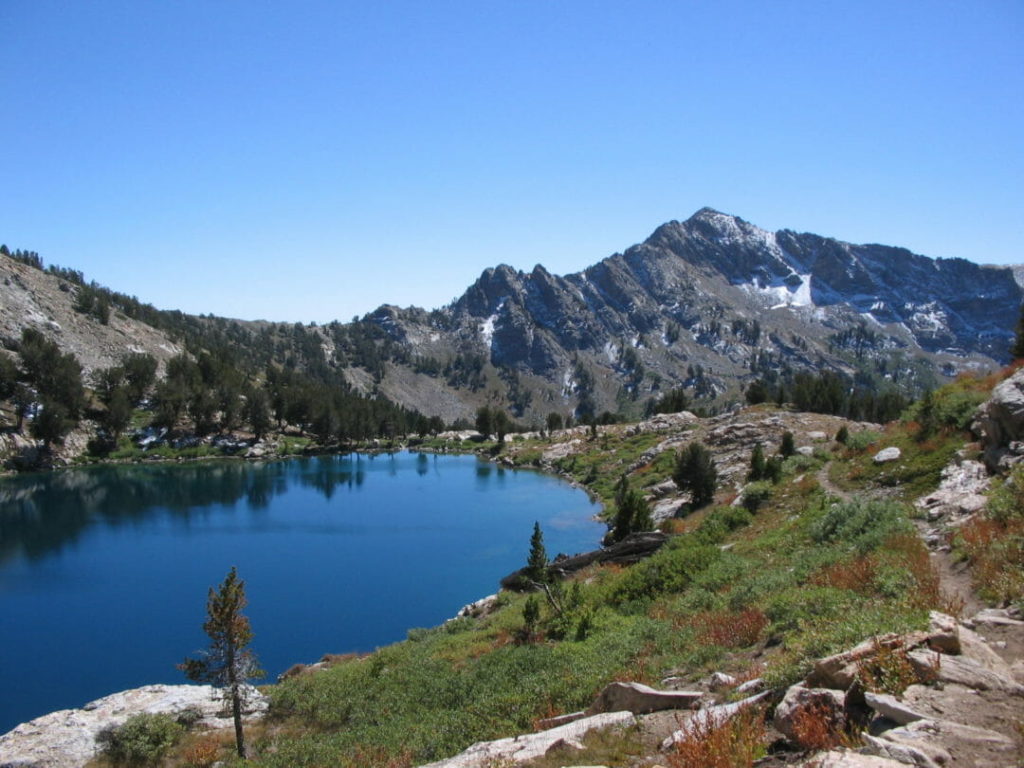Oil and gas leases on public lands continue to be offered for fire-sale prices, oftentimes in conflict with fish, wildlife and public land users. In fact, millions of acres of public land offered for oil and gas leases are being let go for as little as $1.50 per acre.
This speculative leasing is creating mounds of unnecessary analysis and paperwork, diverting public land managers from other priorities like fish and wildlife conservation (learn more). Once leased, the parcel of public land is encumbered with the right to develop for at least 10 years, regardless of energy potential, leading to unnecessary conflicts and public outcry when the leases overlap with important fish and wildlife habitat. Some of the most biggest and most controversial conservation campaigns that Trout Unlimited has been involved in over the past 15 years have come about because of speculative leasing on Forest Service lands. The Thompson Divide on the White River National Forest (Colorado), North Fork of the Flathead on the Flathead National Forest (Montana), Badger-Two Medicine area on the Lewis and Clark National Forest (Montana), and Strawberry Reservoir on the Uinta National Forest (Utah) are just a few of the places where leasing took place unnecessarily.
Trout Unlimited engages in the public process for every quarterly oil and gas lease sale in all Western states to ensure sensitive trout habitat is adequately protected, and we know from experience that the federal oil and gas lease sale system is antiquated and needs to be reformed. Another tool in our toolbox is to engage in rulemaking processes to advocate for responsible energy development of our public lands. Right now, the Forest Service is moving forward with a rulemaking that would establish new regulations for oil and gas leasing and development on national forests and it is one of the most consequential rulemakings we’ve seen for the agency.
What’s happening?
In short, rulemaking is the administrative process of developing or changing regulations. And because regulations carry the force of law, they can have a great impact on the way our natural resources are managed and how certain activities are regulated. The U.S. Forest Service is proposing to revise its regulations pertaining to oil and gas leasing and development on national forest across the country.
We support the efforts to provide for more orderly resource management, but the proposed regulations appear to prioritize energy development over many other forest uses and resources. The push for more oil and gas development on our national forests and grasslands, including iconic landscapes such as Montana’s Tendoy Mountains in the Beaverhead-Deerlodge National Forest and Nevada’s Ruby Mountains in the Humboldt-Toiyabe National Forest, comes at a time where there is a glut of oil and gas. It is also a time when public lands are more important than ever – people need respite, seeking outdoor recreation as one outlet from the challenges posed by 2020.

If it finalizes these regulations as proposed, the Forest Service would establish a management regime that favors oil and gas development over other uses of the land. This follows a 2017 Forest Service report on “promoting energy independence,” which identified 15 actions for “reducing burdens” for energy development.
Currently, the Bureau of Land Management (BLM) cannot lease Forest Service lands unless the Forest Service explicitly approves the specific lease parcels to be sold. Alarmingly, among other changes, the proposed rule removes the Forest Service’s consent to lease for oil and gas as a standard step in the process, instead requiring the Forest Service to proactively withdraw a presumption of approval that is based on forest plans that are often more than a decade old. Currently, when lease nominations come to the BLM for specific lands managed by the Forest Service, these nominations are forwarded to the Forest Service for review to make sure resource protection measures are adequate, previous considerations remain valid, and the parcel remains eligible to be sold; the proposed regulations would upend this process.
As the land manager, it is the local officials with the Forest Service who are best suited to make site-specific leasing decisions, and for the decisions to be made at the time a lease is nominated, not years prior. The proposed rule eliminates this vital step and makes it difficult for the Forest Service to prevent inappropriate leases or even address additional concerns on specific lands, instead relying on implied consent not tied to any specific parcel nominations.
Many forests have recently deferred making oil and gas leasing decisions within their forest plans, but plan amendments could open up millions of acres to a streamlined leasing and development approval process should this rule be adopted. In fact, a 2017 Forest Service briefing paper identified 2,500 lease nominations covering 2.8 million acres that are awaiting new leasing decisions.
Why Now?
With respect to streamlining the leasing process, we question the need to change the process under which these decisions are made. Is there really a problem that this rulemaking addresses, or is it a solution in search of a problem?
Quick decisions are not always good decisions and can create big problems for fish and wildlife and some of our nation’s most valuable water assets. This is especially true because leasing conveys a right for oil and gas exploration and development that the agency cannot take back. For this reason, it is imperative that effective processes remain in place for local Forest Service officials to evaluate and approve — or not — individual lease parcels at the time they are nominated.
The ability and flexibility for local land managers to make leasing decisions on individual forests is already in place, but this ability is hindered by a lack of planning resources, not onerous regulatory burdens. Revising regulations is no substitute for ensuring that the Forest Service and our other public land management agencies have the resources necessary to be effective land managers and make timely decisions based on the best available science.
Why it matters for TU:
One of the big differences between BLM- and Forest Service-managed lands is that national forests are the headwaters of the West. In fact, lands managed by the Forest Service are the largest single source of water in United States. While all public lands are valuable, the value of water provided by national forests is immense, as are the municipal water, recreation, and fish and wildlife resources that depend on cold, clean water.
The Forest Service’s proposed action has the potential to exacerbate the existing problems with leasing public lands based on policies from 19851. In the western U.S., over 71 million acres (45 percent) of Forest Service-managed lands are within native trout watersheds, underscoring the importance of this rulemaking for coldwater conservation.
Of the national forests where oil and gas development potential data exist, only 11 percent have high/medium energy potential. On the other hand, over 85 percent of Forest Service-managed public lands have low/very low/negligible energy potential.
Of the national forests where oil and gas development potential data exist, only 11 percent have high/medium energy potential2. On the other hand, over 85 percent of Forest Service-managed public lands have low/very low/negligible energy potential. Based on what we’ve seen, the agency’s assessment of energy potential has little bearing on decisions whether to offer public lands for lease, creating unnecessary conflicts, wasted agency resources reviewing dubious lease proposals, and divisive land management proposals that often leave hunters and anglers with the short end of the stick. In fact, in the past three years, 4.5 million acres, or 65 percent of all acres offered for sale by the BLM in Colorado, Montana, New Mexico, Utah, Nevada and Wyoming, are on lands classified as having low/no energy development potential.
An expedited, less-informed leasing process coupled with anonymous, speculative lease nominations is cause for concern and we are working with our members, supporters and members of Congress to curb speculative leasing. This issue is at that forefront of our responsible energy campaign work and legislation introduced by Sen. Cortez-Masto (D-NV) would put an end to this wasteful practice.
How will TU respond and how can you help?
- Trout Unlimited filed technical comments in 2018 in response to USFS Advanced Notice of Rulemaking.
- Trout Unlimited will submit formal comments in response to USFS Proposed Action. Deadline for comments is Nov. 2, 2020.
- An outline of key points is provided below.
- We’ve also requested an extension of time for comments.
Make your voice heard: go to the federal rulemaking homepage and click Submit A Formal Comment button to speak up for your public lands. You can use the message points outlined below and TU encourages you to make your own, detailed comments about why national forests matter to you!
Connect with your Council leadership: Several TU Councils have been following this rulemaking and may have additional guidance on engagement from TU leaders in your state.
Specifically, the rule would:
- Reduce public input and transparency by removing the requirement that a Forest Service official give public notice of the decision to approve a Surface Use Plan of Operations, which is the specific plan for development. Our view: Collaboration is one of the most important tools for fostering, effective, efficient land management. When projects are conceived, developed and implemented in a collaborative manner, the result is not only increased efficiency, but also more durable decisions less divisive and prone to legal challenges. Strengthening opportunities for public input around oil and gas development should be a primary objective of any revised regulations.
- Make it more difficult for the Forest Service to deny leases that threaten fish and wildlife by removing explicit confirmation of USFS consent as a standard step in the leasing process. Our view: Hunters and anglers must be assured that the revised regulations will not erode sporting opportunities on public lands. Dubious leasing proposals on national forests have been a problem for over a decade, and in recent years places like the Ruby Mountains, Nevada received attention due to speculative leasing. Fortunately, the Forest Service denied those lease nominations. We expect that if finalized, these regulations would open the door to more public land management conflicts in places with immense water resources and recreation, angling and hunting values.
- Allow the Forest Service to skip important and necessary environmental reviews for oil and gas leasing decisions. Our view: This, together with other attempts to weaken National Environmental Policy Act (NEPA), could lead to policy changes that exempt lease sales from NEPA review. Oil and gas development can be risky and spills are frequent, but energy development and healthy, intact landscapes that can support thriving fish and wildlife populations don’t have to be mutually exclusive. But the reality is that limiting public participation and curtailing environmental review required by NEPA makes this balance harder, not easier, to achieve.
- Not address funding for agency staff and programs. Our view: Creating efficient processes is about more than revising regulations. Without sufficient funding and qualified resource professionals, streamlining regulations is a reaction to symptoms instead of addressing the root causes. Managing 193 million acres of public lands in 43 states and Puerto Rico for multiple uses comes with a cost and ensuring adequate funding is an issue that Congress and the administration must address to not only ensure healthier forests, but a healthier Forest Service.
Comments submitted by Trout Unlimited:
- TU Comments on the U.S. Forest Service’s Advance Notice of Proposed Rulemaking on Oil and Gas Resources Regulations (2018
There are several concerning aspects of the proposed rule and we look forward to engaging with the agency to ensure that we aren’t forsaking some of our most cherished landscapes in a rush to expedite oil and gas leasing and development. For questions or additional information, please contact Corey Fisher, public lands policy director, or Kate Miller, government affairs director.



